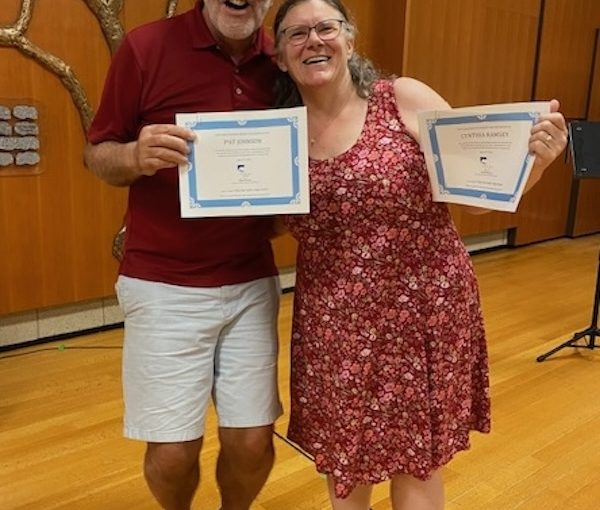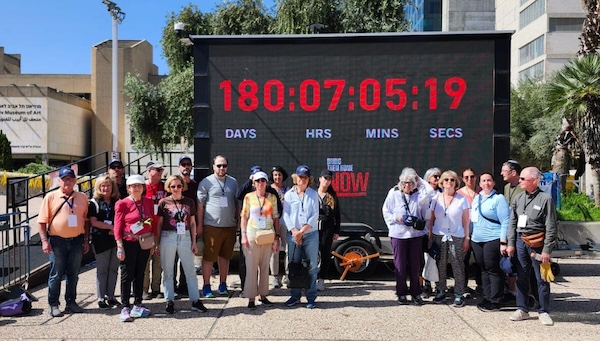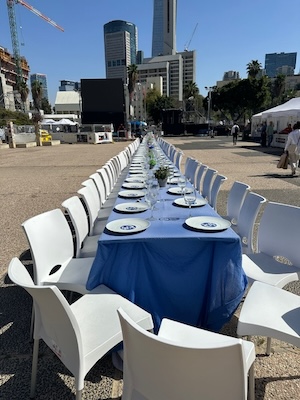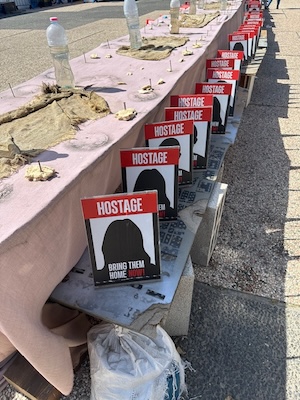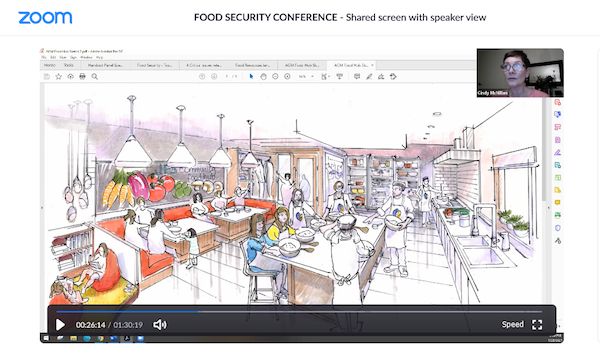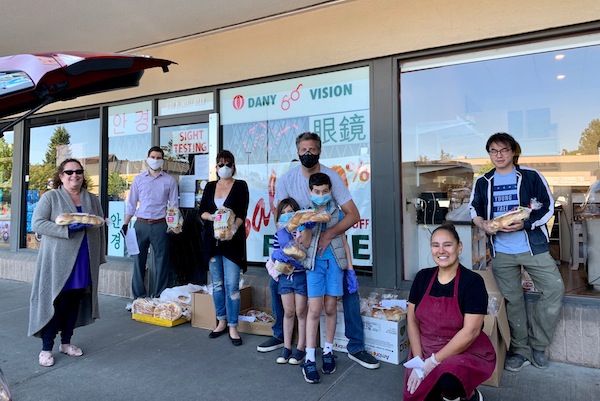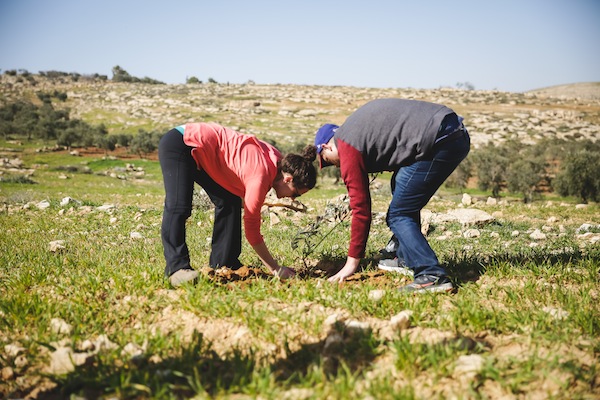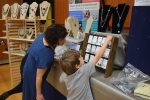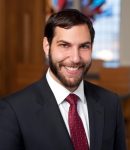Pat Johnson and Cynthia Ramsay after their presentation about the Jewish Independent at Congregation Har El’s Seniors Lunch July 17. The pair were asked to participate by lunch organizers Tim Newman and Kala Solway. They each received a certificate of thanks and a thank-you gift from Noga Vieman, the synagogue’s programming and education director. (photo by Lorraine Katzin)
Tag: Har El
Reflections on April mission
JNF Canada, Har El and Beth Israel mission participants in Hostages Square in Tel Aviv. (photo from Lorraine Katzin)
About 20 volunteers – from Vancouver, Edmonton and Toronto – went on the JNF Canada Bearing Witness Mission to Israel April 1-8. Organized by Jewish National Fund Canada, Congregation Har El and Congregation Beth Israel, the trip was led by BI’s Rabbi David Bluman and JNF Edmonton executive director Jay Cairns. On his Facebook page, Cairns thanks JNF Pacific executive director Michael Sachs, BI Senior Rabbi Jonathan Infeld and Bluman “for spearheading this important mission.” Among the volunteers were Har El members Lorraine Katzin and Karen Shalansky, who shared some of what they experienced with the Jewish Independent.
Some first impressions
(Lorraine Katzin)
Stepping onto the El Al plane from Los Angeles to Tel Aviv reminded me of the olden days of flying – a blanket, pillow, headphones and a bag with a toothbrush, toothpaste and eye mask. Two meals were served and, during the flight, you could help yourself to snacks, sandwiches and drinks.
Walking through Ben Gurion International Airport, you see photos of the hostages still in captivity. When we went through the foreign passport area, it was chilling – we were literally the only people passing through passport control. There were no tourists. Our hotel was quiet as well.
Walking on the promenade in Tel Aviv to Jaffa on our arrival, it felt as if there were no war – people were out on the beach, swimming, playing beach bats, foot volleyball, and jogging.
Tuesday, April 2, was our first full day of touring. We started at Kibbutz Kissufim in the south. We heard stories of the murders and saw the devastation made by the Hamas terrorists. One of the stories that haunts me is that of the chief fireman whose only child, his daughter, and her husband were shot to death in their safe house, then their home was burnt down. Searchers only knew by finding a nose ring and bracelet in the ashes that the bodies had been burnt.
We were very close to Gaza and could hear artillery every now and again, which was scary. At the site of the Nova music festival, there was a memorial of photographs: 364 people were killed there by Hamas, 44 hostages were taken.
On Wednesday, we toured Adi Negev-Nahalat Eran, which is a village for children with disabilities, which JNF supports. Karen and I volunteered at the therapeutic farm, cleaning the goat pen and washing the tortoises. That day we were also taken to the car cemetery, where you see two burnt ambulances, as well as burnt and bullet-holed cars numbering more than 1,000. In Sderot, we saw where the police station used to be – the building was taken over by Hamas terrorists and then an Israeli tank destroyed the building, killing the terrorists inside.
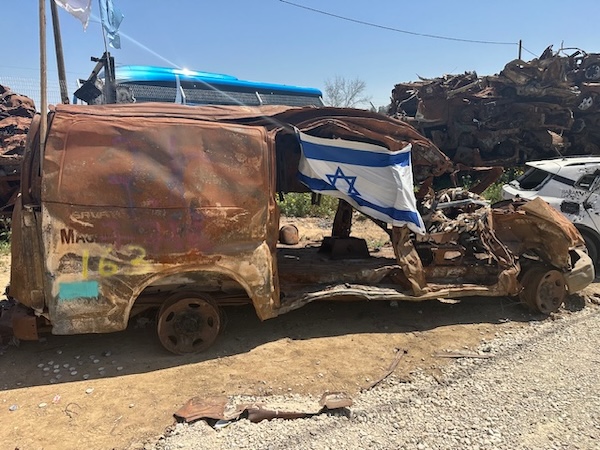
The first few days of the mission, I found it difficult to sleep, the images and stories kept going through my head.
On Thursday, we picked lemons and went to Rachashei Lev Israel Children Cancer Centre, another JNF project. We also visited Hostages Square.
Friday included a visit to Western Canada House, a No2Violence shelter for women and children fleeing domestic violence, the building of which was funded by JNF Canada supporters in Vancouver and Winnipeg. [For more on Western Canada House, see jewishindependent.ca/a-new-refuge-from-violence.] We also went to the ANU Museum of the Jewish People, which had on display models of different shuls in Europe and the United States, a replica of the Codex Sassoon and an Oct. 7 exhibit. After stopping at the Carmel Market, we went back to Hostages Square for Kabbalat Shabbat, which was very moving.
Saturday, we went to the beach in the morning and walked around Tel Aviv in the afternoon. That night, we had a survivor come speak to us and it happened to be Shalev Biton, who had come to speak at Har El and elsewhere in Vancouver a few weeks prior. Amazingly, he remembered me!
On another night, we heard from Jacqui and Yaron Vital, parents of Adi Vital-Kaploun, who was murdered on Oct. 7. Jacqui, who is a Canadian, was in Ottawa visiting family when the Oct. 7 Hamas terror attacks happened. Adi, her husband and two children lived on Kibbutz Holit in the south and Yaron had come to visit; he was put up in a room in a vacant house opposite his daughter’s. Adi texted her husband, who had gone on a hike, warning him not to return home. Adi was killed, and her two children and a neighbour were kidnapped but let go at the Gaza border, by some miracle. Yaron survived, as the terrorists had determined which homes had how many people and who had dogs, which were shot first, but the room Yaron was in was usually vacant, so went unchecked by the terrorists.
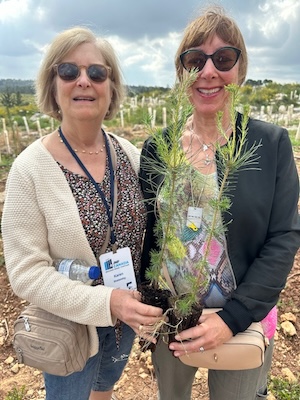
On Sunday, April 7, we went JNF tree planting. We visited the Black Arrow Memorial, where, from the lookout, you can see Gaza. There, we were given a briefing by retired colonel Kobi Marom, whose opinion was that the Palestinian Authority should be enlisted to run Gaza. We then traveled to the Israel Defence Forces base at Nahal Oz for lunch with the soldiers – these 19-, 20- and 21-year-olds going into Gaza are truly amazing! The soldier I sat with, his name was Daniel and he was from Eritrea. We were so close to Gaza that we could see convoys of food trucks going through the Rafah Border Crossing.
Monday, our last day, we went to Jerusalem to two places that JNF supports: the Jerusalem Hills Therapeutic Centres, which provides services for at-risk children, and the Glassman PTSD and health centre at Herzog Hospital. We then visited the market and went for a walk down Ben Yehuda Street, the Kotel and the tunnels, and had dinner at Piccolino restaurant before heading to the airport. We were joined by Jewish Federation of Greater Vancouver executive director Ezra Shanken and Rabbi Jonathan Infeld from Congregation Beth Israel.
Israel trip highlights
(Karen Shalansky)
I went to Israel to show my support in its time of need, as well as to hear the views of Israelis and their feelings toward the war. Through our many experiences, I felt I accomplished my mission.
Listening to the diverse perspectives of our guide, the young soldiers and guards on our bus, my 31-year-old cousin who made aliyah right after high school and is now fighting in the reserves, Lorraine’s Israeli friends, a retired colonel and others, I heard varying opinions on many topics. For example, should Israel invade Rafah, should there be a ceasefire, should the release of the Israeli hostages be the No. 1 priority, should there be an election, who should oversee Gaza after the war? While there was always more than one answer to every question, there were consistent feelings among everyone we met of resilience, strength and perseverance – that this war is another of many, and that Israel will carry on. As well, everyone we met was both amazed that we came during war and so happy that we had made the effort. That happiness alone made Lorraine and I feel that this trip was worthwhile.
Some highlights of the trip for me were:
1) Visiting Hostages Square in Tel Aviv for Kabbalat Shabbat. This is a square that has Shabbat tables set up for both the released hostages (with blue tablecloth and wine glasses) and for the hostages still being held (with dirty water and stale pita). There was a wonderful band playing, with a singer, and, at one point, there was a chance for people to stand up and say something. Lorraine was our spokesperson and announced that we were on a trip from Canada to support Israel. Several Israelis came up to us afterwards to shake our hands and welcome us. When the band sang Lecha Dodi, a few people got up to dance the hora, including Lorraine and me.
2) Visit to Shlomit settlement in the southern Negev. This was a religious settlement that JNF helped build. As an aside, JNF has been very active in rebuilding bomb shelters and kibbutzim that were destroyed on Oct 7. At Shlomit, we heard from Dana, a mother of six children, about how her husband and four other men went to a neighbouring kibbutz to fight the terrorists. While the men were successful in killing all five terrorists, her husband, unfortunately, was shot dead. Dana said she wanted her children to remember her husband as a hero, and to foster a sense of hope, not hate. In this inspirational talk, she kept emphasizing that we can’t live with hate, only with love and hope.
3) A talk from a trauma psychologist at the Glassman centre. While post-traumatic stress has risen substantially in Israel, this psychologist told us a story of an army unit that recently returned from a three-month stint in Gaza. Prior to going home, the unit visited one of the soldier’s grandmothers, who was a Holocaust survivor. The attacks by Hamas on southern Israel have been equated to a second holocaust, but, upon asking the grandmother’s views, she said “no,” the attacks were nothing like the Holocaust. We have a country and a people that will fight for us now, whereas in 1940 we had nobody, she said. She concluded: we are never alone again, as long as there is an Israel.
Learning opportunities
While a report this spring by the New York-based Jewish Education Project showed a decline in Jewish supplementary education in North America over the past 15 years, participation in after-school and weekend educational programs in British Columbia is on the rise.
Since the 1990s, the Jewish Federation of Greater Vancouver has provided small grants to local supplementary schools; at present, it funds 11 programs. And, in 2015, Federation convened the Jewish Education Task Force to look into the state of part-time education.
“Through this work, we recognized the importance of focusing on innovation and change to attract a new generation of families,” said Shelley Rivkin, Federation’s vice-president of local and global engagement. “We were able to provide innovation grants and professional development opportunities for supplementary school educators to learn new and diverse ways to offer Jewish education. More importantly, we expanded the definition of fundable supplementary schools to include Shabbat, family and Hebrew literacy programs.”
According to Rivkin, while the Jewish Education Project report brought attention to the fall in enrolment elsewhere (see jewishindependent.ca/drop-in-jewish-learning), Federation’s experience has been that enrolment here has either remained stable or grown in the last few years.
“We have seen significant gains in supplementary school enrolment in both the regional and emerging communities, where families are seeking opportunities to connect with other Jewish parents and provide opportunities for their children to have Jewish experiences,” Rivkin said.
For example, BC Regional Hebrew Schools, operated through Chabad and funded in part by Federation, has become an important part of building Jewish community life in places like Langley, Coquitlam and Whistler. Likewise, programs directed toward Hebrew-speaking families, which have a broader focus on Israeli culture, are attracting new families who are looking for different content.
“We have seen all of our supplementary school providers adapt and change in response to changing demographics. All offer a range of activities utilizing innovative teaching methods and engaging content to appeal to a diverse group of children and their families,” Rivkin said.
The same is true for the Lower Mainland, where Federation notes that supplementary schools are making a difference as well.
“The Jewish Federation’s Supplementary School Grant helps us in many ways,” said Noga Vieman, education director of Congregation Har El in West Vancouver. “First, we believe that every child in every Jewish home deserves an enriching Jewish education and experience. The grant helps us keep the program reasonably priced, and offers us the opportunity to create scholarships for those in need, so that financial challenges will not prove a barrier to getting quality Jewish education and becoming part of the Jewish community.”
The grant also helps Har El provide its teachers with fair compensation, allowing the North Shore Jewish centre to attract and retain quality educators with a passion for working with children and building the future of the Jewish community in the region.
Further, part of the grant Har El receives is dedicated to funding classroom assistants to help increase inclusion.
“In our program, this money goes towards paying for an education assistant for a child who is blind, and also for teens who help children with different learning abilities, and who need personal support during class,” Vieman said. “This helps to create intergenerational connections, and keeps the teens involved in the community past their own education in our program.”
At the Peretz Centre for Secular Jewish Culture, the Federation grant has been used for Pnei Mitzvah, its secular humanist program for youth aged 10 to 14 that focuses on the Hebrew language, Bible stories, Jewish holidays and Jewish culture.
“We have been growing the program in recent years and have expanded it province-wide through an online cohort,” said Maggie Karpilovski, executive director of the Peretz Centre. “This growth would not be possible without Federation’s funding. It allowed us to attract expert teachers and innovate the delivery model so that it is accessible to more Jewish families throughout the region. As we are the only secular Jewish humanist organization in BC, and the Jewish community is spread out quite widely, it is important for us to make our programs accessible.”
Jen Jaffe, school principal at Temple Sholom, confirms the value of Federation’s financial support. “The grants allowed us to become more accessible to students of varying learning needs,” she said.
At Temple Sholom, the funding has been used to contribute to the school’s madrichim program and create a “learning hub” space for students with needs including sensory materials and furniture. The space is used each time school is in session.
“We need to celebrate these successes,” said Rivkin, “and applaud the educators and parents who are ensuring the survival of part-time Jewish education.”
To donate to Federation’s annual campaign, visit jewishvancouver.com.
Sam Margolis has written for the Globe and Mail, the National Post, UPI and MSNBC.
Judaism’s differing practices
Burquest Jewish Community Centre has invited a series of local Jewish leaders to visit the centre and discuss their approach to Jewish practice. A Coat of Many Colours: Conversations about Jewish Practice takes place every other Sunday, through Dec. 11. It started Oct. 16.
Rabbi Laura Duhan-Kaplan – rabbi emerita of Or Shalom (Renewal), volunteer at Beth Israel (Conservative) and director of inter-religious studies and professor of Jewish studies at Vancouver School of Theology – began the series with a talk called An Integrative Spirituality.
On Oct. 30, 1:30 p.m., Congregation Har El’s Rabbi Philip Gibbs speaks on The Conservative Synagogue and the Modern Jew.
“As a Conservative rabbi, I believe that Jewish law develops over time so that even a deep commitment to live according to Jewish values, traditions and rituals can fit with modern sensibilities,” he said. “At the same time, as a community leader, I also recognize that not every person wants to or is able to follow the discipline of an observant life. The synagogue acts as a spiritual toolbox with the many rituals and values that can add meaning to your life. The tension between an individual’s interest and the communal practice is both a challenge to create a welcoming space and an opportunity to explore the deeper meaning of our tradition. We will look at a few examples of how a synagogue could approach rituals like kashrut, prayer and Shabbat.”
Rabbi Tom Samuels of Okanagan Jewish Community Centre, Beth Shalom Synagogue, will give the Nov. 13, 1 p.m., talk, on the topic From Synagogue to Home.
Samuels, who does not identify with any singular Jewish denomination, institution, theology, pedagogy and the like, said, “My session will explore the idea of relocating the North American model for ‘doing Jewish religion’ from the synagogue building to the home. In response to the destruction of the Second Temple, a new Judaism emerged called Rabbinic Judaism. The ancient rabbis established a new locus of Jewish identity and connection to the home, and specifically, to the shulchan, the Shabbat table. Using the model of the Chassidic tish (or botteh, or what Chabad Lubavitch call the farbrengen), we will experience the seamless tapestry of Torah learning, tefillah (prayer), singing and eating that could be replicated by Jewish communities, with or without a local synagogue, throughout North America.”
On Nov. 27, 1 p.m., Temple Sholom’s Rabbi Dan Moskovitz will speak on These Are The Things – 10 Commandments for Living a Purposeful Life.
“Reform Judaism in general emphasizes the moral ethical commandments as being obligatory while the spiritual ritual commandments are more subjective to the individual worshipper with the autonomy to make meaningful, informed choices in their personal practice,” said Moskovitz. “My current rabbinate as senior rabbi of Temple Sholom is shaped by an emphasis on finding meaning through Jewish custom and practice, social justice work, inclusion, outreach to the unaffiliated and developing a relational community.
“I will present a passage from the Mishnah called Elu Dvarim, which details 10 commandments that, if followed during your life, receive reward now and for eternity…. I will present and we will discuss how the application of these particular commandments to your life, regardless of your faith tradition or whether or not you even have one, is one answer to the eternal question what is the meaning of life.”
Rounding out the presenters will be Rabbi Dovid Rosenfeld, Chabad Lubavitch, on Dec. 11, 1 p.m., with a topic to be announced.
Further information on presentations and presenters is available under events at burquest.org.
Lessons from the pandemic
Zoom presentations became a regular affair at Beth Israel during the pandemic. Inset: JFS director of programs and community partnerships Cindy McMillan provides an overview of the new Jewish Food Bank. (screenshot from BI & JFS)
As Vancouver-area synagogues cautiously edge their way toward reinstituting in-person religious services, many rabbis are doing a rethink about the impact that the past 17 months of closure has had on their congregations.
Finding a way to maintain a community connection for thousands of Jewish families became an imperative for all of the synagogues early on in the pandemic. Not surprisingly, for many, the answer became cutting-edge technology. But careful brainstorming and halachic deliberations remained at the heart of how each congregation addressed these urgent needs.
“We immediately realized that services per se were not going to work over electronic medium,” Congregation Schara Tzedeck’s Rabbi Andrew Rosenblatt told the Independent.
He said Orthodox rabbis across the world were already discussing halachah (Jewish law) in light of the pandemic when the province of British Columbia announced the shutdown in March of last year. “We realized that we weren’t going to offer any services,” he said. “We can’t have a minyan online.”
But that didn’t mean they couldn’t offer support. Schara Tzedeck’s answer to that need was only one of many innovative approaches that would come up. For example, to help congregants who had lost family members, the Orthodox shul devised a new ritual, as the reciting of the Mourner’s Kaddish requires a minyan (10 men or 10 men and women, depending on the level of orthodoxy, gathered together in one physical location).
“What we did is immediately [start a Zoom] study session in lieu of Kaddish. [The Mourner’s] Kaddish is based on this idea of doing a mitzvah act, which is meritorious for the sake of your loved one, so we substituted the study of Torah for the saying of Kaddish,” he explained.
For many other communities, such as the Conservative synagogue Congregation Beth Israel, the deliberations over how to apply halachah in unique moments such as these were just as intense. For these instances, said BI’s Rabbi Jonathan Infeld, rabbis saw another imperative.
“This is what is called she’at had’chak, or a time of pressure,” Infeld said. “It’s a special time, it’s a unique time, and so we adapted to the time period.”
The concept allows a reliance on less authoritative opinions in urgent situations. So, for example, with respect to reciting the Mourner’s Kaddish, Infeld said, “We felt that, especially in this time period, people would need that emotional connection, or would need that emotional comfort of saying Mourner’s Kaddish when they were in mourning, and so we have not considered this [internet gathering to be] a minyan, except for Mourner’s Kaddish,” Infeld said. He noted that the Committee on Jewish Law and Standards of the Rabbinical Assembly, which reviews halachic decisions for the Conservative movement, has adopted the same position.
Rabbi Shlomo Gabay, who leads the Orthodox Sephardi synagogue Congregation Beth Hamidrash, said that although his congregation would not hold Mourner’s Kaddish online, venues like Zoom played a vital role in allowing the congregation to meet during shivah, the first seven days of mourning. Like a traditional shivah, which takes place in the mourner’s home, often with a small number of visitors, an online shivah gave community members a chance to attend and extend support as well.
“That was actually an especially meaningful [opportunity],” Gabay said. “The mourners, one after another, told me that, first of all, you don’t often get the opportunity to have so many people in the room, all together, listening.”
For members of the Bayit Orthodox congregation in Richmond, an online shivah meant family on the other side of the country could attend as well. “What was most interesting, of course, was the people from all across the world,” remarked Rabbi Levi Varnai. “You can have people who are family, friends, cousins, from many places in the world, potentially.”
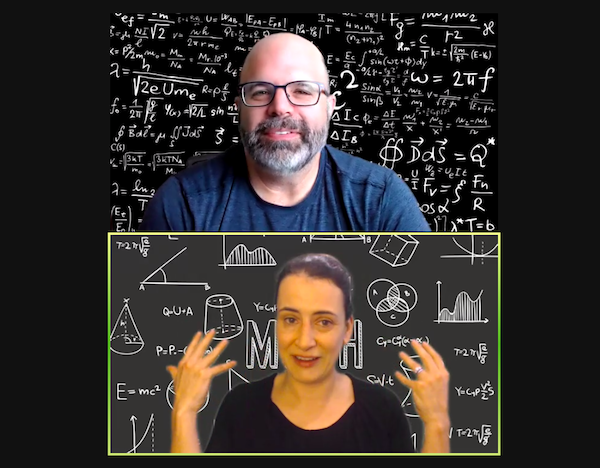
Vancouver’s Reform Congregation Temple Sholom also came to value the potential of blending online media with traditional venues. Rabbi Dan Moskovitz said the congregation had been streaming its services and classes as much as a decade before the pandemic arrived. But lifecycle events, he said, demanded a more personal approach, one that would still allow families to actually participate in reading from the Torah scroll, while not violating the restrictions on large public attendance.
“The big change is that we brought Torah to everybody’s home,” he said. Literally. Moskovitz or his associate, Rabbi Carey Brown, would deliver the scroll in a large, specially fitted container, along with a prayer book, instructions and other necessary accoutrements.
“We had a document camera so, when we streamed, you could look down on the Torah as it was being read on screen. Those were very special moments on a front porch when I would deliver Torah, socially distanced with a mask on, early on in the pandemic,” he said. “I had a mask and I had rubber gloves and they had a mask, and you put something down and you walked away. We got a little more comfortable with service transmission later on.”
International classes
Switching to online media also has broadened the opportunities for classes and social connections. Infeld said Beth Israel moved quickly to develop a roster of classes as soon as it knew that there would be a shutdown.
“We realized right away that we can’t shut down. We may need to close the physical building, but the congregation isn’t the building. The congregation is the soul [of Beth Israel]. We exist with or without the building,” he said. “And we realized that for us to make it through this time period in a strong way, and to emerge even stronger from it, we would have to increase our programming.”
He said the synagogue’s weekly Zoom and Learn program has been among its most popular, hosting experts from around the world and garnering up to 100 or more viewers each event. The synagogue also hosts a mussar (Jewish ethics) class that is regularly attended. “We never had a daily study session,” Infeld said. “Now we [do].”
For Chabad centres in the Vancouver area, virtual programming has been a cornerstone of success for years and they have expanded their reach, even during the pandemic. “We have had more classes and more lectures than ever before, with greater attendance,” said Rabbi Yechiel Baitelman, who runs Chabad Richmond.
Zoom and other online mediums mean that the centres don’t have to fly in presenters if they want to offer an event. Like other synagogues, Chabad Richmond can now connect their audiences directly with experts from anywhere in the world.
“We can’t go back”
All of the synagogues that were contacted for this story acknowledged that online media services had played an important role in keeping their communities connected. And most felt that they will continue to use virtual meeting spaces and online streaming after the pandemic has ended.
“As our biggest barrier to Friday night participation was the fact that many families were trying to also fit in a Shabbat dinner with small children, the convenience of the Friday livestream is worth including in the future,” said Rabbi Philip Gibbs, who runs the North Shore Conservative synagogue Congregation Har El.
“We’re scoping bids to instal a Zoom room in our classroom space so that we can essentially run a blended environment,” Rosenblatt said. “We anticipate, when restrictions are lifted, some people will still want to participate by Zoom and some people will want to be in person.”
However, some congregations remain undecided as to whether Zoom will remain a constant in their services and programming.
Rabbi Susan Tendler said that the virtual meeting place didn’t necessarily mesh with all aspects of Congregation Beth Tikvah’s Conservative service, such as its tradition of forming small groups (chavurot) during services. “We are talking about what that will look like in the future,” she said, “yet realize that we must keep this door open.”
So is Burquest Jewish Community Association in Coquitlam, which is looking at hybrid services to support those who can’t attend in person. “But these activities will probably not be a major focus for us going forward,” said board member Dov Lank.
For Or Shalom, a Jewish Renewal congregation, developing ways to bolster classes, meditation retreats and other programs online was encouraging. Rabbi Hannah Dresner acknowledged that, if there were another shutdown, the congregation would be able to “make use of the many innovations we’ve conceived and lean into our mastery of virtual delivery.”
For a number of congregations, virtual services like Zoom appear to offer an answer to an age-old question: how to build a broader Jewish community in a world that remains uncertain at times and often aloof.
The Bayit’s leader, Rabbi Varnai, suggests it’s a matter of perspective. He said finding that answer starts with understanding what a bayit (home) – in this case, a Jewish house of worship – is meant to be.
The Bayit, he said, is “a place for gathering community members and for coming together. The question, how can we still be there for each other, causes us to realize that we can’t go back to as before.” After all, he said, “community service is about caring for each other.”
Jan Lee’s articles, op-eds and blog posts have been published in B’nai B’rith Magazine, Voices of Conservative and Masorti Judaism, Times of Israel and Baltimore Jewish Times, as well as a number of business, environmental and travel publications. Her blog can be found at multiculturaljew.polestarpassages.com.
Challah delivery
Left to right are Lynne Fader (Kehila Society), Adam Ben-Dov (Connect Me In), Toby Rubin (Kehila Society), Michael Sachs (with daughter Desi and son Izzy), Monica Flores and Steve Uy (Garden City Bakery). (photo from Kehila Society)
The Covid Challah Initiative was started by Michael Sachs and is a partnership between Richmond’s Kehila Society, Richmond’s Garden City Bakery, Jewish Federation of Greater Vancouver’s Connect Me In and North Vancouver’s Congregation Har El. The initiative aims to ensure that everyone in Metro Vancouver who needs a (free) challah is delivered one. (For the story of how the initiative started, see citynews1130.com/2020/05/03/challah-delivery-covid-richmond-family.) To sign up for a challah contact, visit jewishvancouver.com/challah-delivery. Each week’s registration opens on Monday and closes Thursday at noon – and people need to register each week, as this is not a recurring service.
Educating rabbinical students
T’ruah students help plant trees in the Hebron Hills. (photo from T’ruah)
U.S.-based T’ruah: The Rabbinic Call for Human Rights works in Jewish social justice circles in Israel and North America.
“We work with human rights of both Israelis and Palestinians…. We’ve also worked on introducing rabbis and rabbinical students, and also congregations, to what’s happening in West Bank and more,” executive director Rabbi Jill Jacobs told the Independent.
T’ruah, which supports a two-state solution, offers the Year-in-Israel program for rabbinical students.
“Students study in Jerusalem at various institutions,” said Jacobs, “but they don’t necessarily get to see human rights issues up close. We take them once a month to see a human rights issue on the ground, either in the West Bank with Palestinians, in Bedouin Israeli communities in the Negev, asylum seekers, etc.”
At these sessions, students meet with Israeli human rights and other leaders on the ground. The program is held during students’ free time, separate from their regular studies.
“The goal of the program is to help them develop a rabbinic moral voice,” said Jacobs. “As rabbis, they’re going to be called on to speak about Israel. The question is, how do they talk about Israel as a rabbi? Rabbis talk out of their values, and also are generally dealing with politically diverse communities…. So, the question is, how can a rabbi speak in a way that will push people to listen to perspectives they might not otherwise listen to, [based on] Jewish texts and Jewish values?”
Jacobs recognizes that the information they provide is not comprehensive. Their focus is to give students the opportunity to interact with human beings – to meet Palestinians, Bedouins and others and learn from them what their life experience is like.
“It’s also crucial to us that they are meeting with Israeli human rights leaders,” said Jacobs. “Very often, there’s a dichotomy that suggests that being pro-Israel means supporting the right-wing government of [Binyamin] Netanyahu and that being pro-Palestinian means being against Israel. We’re pro-human rights and we want them to meet Israelis working every single day to push for human rights in their own country because they love their country. We want them to see that there are actually people who are changing the situation.
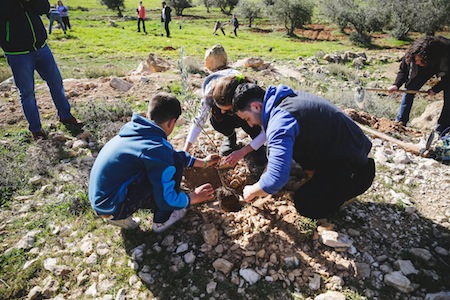
“We hear a lot from the students that our program gives them hope. Sometimes, they are so hopeless about what is happening in Israel and then they meet people, both Jewish and Palestinian communities, who are trying to change their situation.”
One T’ruah graduate is Rabbi Philip Gibbs, spiritual leader of Congregation Har El in West Vancouver.
“During my year in Israel, during my second year of rabbinical school, I had the opportunity to then be a fellow with T’ruah for their rabbinical student program,” Gibbs told the Independent. “I really appreciated the opportunity, both because, at least the year I was doing it, there was clearly a huge focus on the Israeli-Palestinian conflict. But, also because the way, in terms of educating about social justice issues in Israel, they were able to show some of the other issues happening – whether it was meeting with Bedouins, talking to some asylum seekers from Africa … really seeing what their home-grown needs are and seeing how it developed into a strong sense of the how they were fighting for many of those needs through the legal systems in Israel.”
Gibbs met with Palestinians who had been displaced from the Jerusalem area after the 1967 war. “We had the chance to hear their narrative,” he said, “highlighting how their status as refugees during that conflict had really come into question because of both the policies of Jordan, as they were occupying the area, as well as some of the motivations of different settler organizations in their attempt to create a much stronger Jewish presence behind the Green Line… I felt like that was more educating us in understanding the way that the nature of a lot of these neighbourhoods had been going back and forth.
“For the Israeli settlers, they felt they were reclaiming a neighbourhood that was Jewish. For the Palestinians that had been living there, their legal status was caught up in layers of legal confusion of having that area under control of many different authorities over the past 150 years.”
Gibbs has not yet had an opportunity to bring this part of his rabbinical education to his congregation directly, but it has definitely played a role in how he shares his perspective regarding, for example, the upcoming Israeli election.
“I’m making sure there’s a deeper sense of having the recognition that a lot of these questions that are coming up, some of these issues are on the minds of most Israelis … but that, no matter what, a lot of the work that human rights organizations are doing, a lot of that is going through the overt legal system of Israeli government.”
Regarding the many Israelis he has met who work for human rights organizations, Gibbs said he appreciated the way their main motivation was a deep sense of trying to make their country the best it can be, noting that every government needs to be transparent in their treatment of their citizens, allowing for a certain amount of criticism.
“That’s something coming from a place of love and it’s the most ideal way to get things done in a constructive way,” said Gibbs. “People can debate about how much people living outside of Israel are supposed to be making any sort of direct intervention, which happens on both sides of the political spectrum, but, I think, there’s absolutely nothing that we should hide in terms of understanding the full array of political work happening in Israel.”
Rebeca Kuropatwa is a Winnipeg freelance writer.
Artisan in training
Joel Harrington chats with Ande Axelrod from Tagua, who makes jewelry from nuts grown in the Amazon (treatsdesigns.com), at a gathering of B.C. artisans at the North Shore Jewish Community Centre (Har El Congregation) on Oct. 16. (photo by Shula Klinger)
Thrilled by community
Rabbi Philip Gibbs is the new spiritual leader of Congregation Har El. (photo from Rabbi Philip Gibbs)
Rabbi Philip Gibbs, who took up the pulpit at Congregation Har El / North Shore Jewish Community Centre in July, had an unusually straight path to Judaism in many ways, at least for someone living outside the Orthodox world.
“Judaism was always part of my life,” Gibbs told the Independent.
Growing up in Marietta, Ga., he attended a Reform synagogue, went to Hebrew school and lived in a home life structured by Judaism. He found Judaism both comforting and intellectually engaging. He loved the thorny moral questions of Jewish tradition and studying Torah stories for guidance about how to live in the world. By the time he finished high school, he was on the regional board of the Reform Jewish Youth Movement (NFTY).
Being a leader in NFTY helped Gibbs see what it meant to bring others to and through the experience of Judaism – and the seed of a rabbinic calling was planted.
Gibbs went to college at Washington University in St. Louis, Mo., and graduated in 2012 with a double major in Hebrew and the humanities. He also attended summer programs for intensive Talmud study and, as he settled into “that place of serious learning about Judaism,” he felt at home. He was enamoured by how the Jewish community supported each other in times of crisis and celebration, giving a wider sense of meaning to even happy moments.
Gibbs attended the Jewish Theological Seminary (JTS), attracted “by its academic emphasis and its acknowledgment of the evolution of Judaism.” It also fit his personal level of observance.
He focused on Talmud and halachah (Jewish law) at the seminary and became the secretary of the committee on Jewish law and standards. He became passionate in his interest in halachah, both theoretically and as a “road to values.” He enjoyed taking ritual practice and explaining “the goal and meaning of it from a place of depth.”
Gibbs graduated with a master of arts in Talmud and received his rabbinic ordination earlier this year.
As a rabbinical student, he was engaged with global social justice and human rights issues, and became a member of Rabbis Without Borders. In his second year, after touring Hebron with T’ruah, a rabbinic human rights organization, he was featured in an article in the Forward about younger rabbis willing to grapple fully with the moral complexity of life in Israel.
Gibbs connected to Congregation Har El, which has been without a permanent spiritual leader for just over a year, through the JTS matching process for new rabbis. He had been to Vancouver before and looked forward to flying out for the interview.
“B.C.’s wilderness and outdoors activities are a big draw for me,” said Gibbs, who led the Jewish Outdoor Leadership Institute camp Ramah in the Rockies and is looking forward to the hiking and skiing opportunities available in the Vancouver area. “I grew up doing a lot of hiking in the southeast and led backpacking trips with Conservative movement summer camps. When I got here, I was also thrilled to find a community of very nice and caring people, a place that wanted depth in what they were doing.”
Gibbs said his main priority right now is getting to know the community before he begins putting together any new ideas. He is also getting to know Vancouver.
“It’s great,” he said. “One of the first things I did was get a bike – it’s a city very easy to get around in. My first view was before the forest fire smoke came in, and it was absolutely beautiful.”
Matthew Gindin is a freelance journalist, writer and lecturer. He writes regularly for the Forward and All That Is Interesting, and has been published in Religion Dispatches, Situate Magazine, Tikkun and elsewhere. He can be found on Medium and Twitter.
Community achievements, travel & good deeds
Jeffrey and Elizabeth Nider, a local couple from Vancouver, were part of more than 200 North American immigrants to move to Israel on July 4. (photo from Nefesh b’Nefesh)
***
The board of directors of Jewish Federation of Greater Vancouver and the board of governors of the Jewish Community Foundation are pleased to announce the appointment of Marcie Flom to the position of executive director of the foundation. Marcie brings more than 25 years of nonprofit leadership experience to the role.
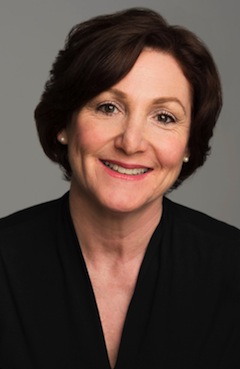
Marcie previously served as both director of JCF and vice-president, financial resource development, of Jewish Federation, where she was responsible for the revenue functions of the organization, including the annual campaign, special projects and corporate funding of nearly $15 million annually. Prior to that, she had a consulting practice and held leadership roles at the Vancouver Playhouse Theatre Company and the National Ballet of Canada.
“I am very pleased to welcome Marcie into her new role,” said Ezra Shanken, chief executive officer of Federation. “Marcie has extensive development and planned giving experience, along with a solid record in major gift fundraising, which perfectly positions her to lead the foundation through the next phase of growth.”
“I am thrilled with Marcie’s appointment and look forward to continuing our strong working relationship,” said Judi Korbin, chair of the foundation’s board of governors. “In addition to her decades of experience and stellar track record, Marcie’s work is characterized by her donor-centric approach. On behalf of the board of governors, I would like to say that the Jewish Community Foundation is extremely fortunate to have Marcie as its new executive director.”
This newly created role is one of several outcomes of the strategic planning process recently undertaken by JCF under the leadership of Korbin and with professional guidance from a strategic management and development consultant. It is a central component of the three-year operational plan approved by Jewish Federation’s board of directors and adopted by the foundation’s board of governors. The foundation’s new strategic and operational plans were driven by Jewish Federation’s 2020 Strategic Priorities, and will serve to support the organization’s overall goals of generating the resources required to address the community’s current, emerging and future needs.
“The foundation is investing in resources, including full-time staff for the first time since the economic downturn in 2008. Re-investing in staff resources will enable the Jewish Community Foundation to grow, which is critical to the long-term viability of the Jewish community. The board of governors remains committed to ensuring the philanthropic goals of the foundation’s fund holders are fulfilled, that our community organizations are strengthened and that the continuity of the Jewish community is ensured through legacy planning,” said Korbin.
* * *
At the Jewish Federation of Greater Vancouver’s annual general meeting on June 20, Karen James became the new board chair, while Stephen Gaerber is now immediate past chair. Marcie Flom was appointed executive director of the Jewish Community Foundation and Diane Switzer was appointed an honorary life director of Federation. The Young Leadership Award was presented to Bryan Hack and Mike Sachs, the Elaine Charkow Award to Lisa Pullan for her ongoing leadership role in women’s philanthropy and the inaugural Bob Coleman Award to Risa Levine for her leadership role on the local allocations committee, positively impacting Federation’s partner agencies.
* * *
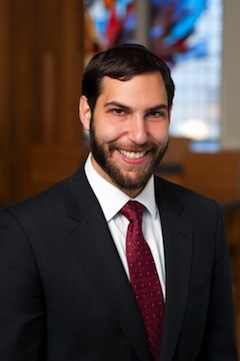
Rabbi Philip Gibbs is the new spiritual leader of Congregation Har El in West Vancouver.
Gibbs grew up in Marietta, Ga. He went to college at Washington University in St. Louis and graduated in 2012 with a double major in Hebrew and humanities. After college, he attended rabbinical school at the Jewish Theological Seminary, receiving a master of arts in Talmud and rabbinic ordination in 2017. During his time at JTS, he had the opportunity to work in different synagogues and appreciated the warmth and mutual support in synagogue communities.
Following his love of the outdoors, Gibbs led the Jewish Outdoor Leadership Institute at Ramah in the Rockies, and is looking forward to hiking and skiing in the Vancouver area. He served as the secretary to the Committee on Jewish Laws and Standards. Playing violin since childhood, he also had the opportunity to join the JTS house band, the Committee on Jewish Music and Standards, for celebratory occasions.
The entire community is invited to come and meet Gibbs at a Shabbat dinner at Har El on July 28. For more information about the event, click here.
* * *
A true mensch resides in the Vancouver Jewish community, and that person is Aria Smordin. Aria has just returned from a gap year in Israel and, while there, did something that greatly impacted the lives of children with special needs in Jerusalem. Aria participated in the Shalva Ambassadors Program, investing time and energy volunteering at the Shalva National Centre.
At the centre, life-changing services are provided to thousands of flourishing kids every year. As an ambassador, Aria not only volunteered every week, but was responsible for bringing in new volunteers. Many of them ran the Jerusalem Marathon for Shalva, threw parties for the Shalva kids (where they all danced like crazy) and sleepovers, and even got their hands dirty painting the recycling centre and working in the therapeutic garden.
Aria’s choice to be in a position of giving is a true inspiration to us all.
In Aria’s own words, “Volunteering at Shalva was rewarding, uplifting and gratifying. There is a strong feeling of love and homey-ness that permeates the entire (beautiful) building. From the first time I visited Shalva, to all the times I came back to volunteer, these feelings always remained the same. The service Shalva provides and the care they take in doing so is inspiring. I am truly thankful that I was able to assist in carrying out their mission.”
Thank you, Aria. We at the Shalva National Centre are looking forward to seeing what you do next and to writing about next year’s fleet of mensches from Vancouver!
* * *
Jeffrey and Elizabeth Nider, a local couple from Vancouver, were part of more than 200 North American immigrants to move to Israel on July 4, on a chartered Nefesh b’Nefesh flight, the organization responsible for removing or minimizing the financial, professional, logistical and social obstacles of immigration to Israel.
The charter flight took off from JFK Airport in New York City and is in partnership with Israel’s Ministry of Aliyah and Integration, the Jewish Agency for Israel, Keren Kayemeth Le’Israel and Jewish National Fund-USA.
The Niders will be moving to Beit Shemesh with their four children, ages 10, 7, 5 and 2. Both Jeff and Elizabeth will enrol in Hebrew classes and Jeff will be looking for work in pharmaceutical sales or in business development for a medical startup.
* * *
The 35th Annual Jessie Richardson Theatre Awards were held on June 26 at the Commodore Ballroom, saluting excellence in theatre. Among the winners was Itai Erdal for O’wet/Lost Lagoon, presented by Alley Theatre in association with Full Circle: First Nations Performance, in the category of outstanding lighting design, small theatre.
With numerous theatre companies in the small theatre category, eight companies earned a Jessie, with Reelwheels (Rena Cohen, managing artistic director) leading the group with total of three for their production of Creeps, which co-starred David Bloom and David A. Kaye. The winners were Lauchlin Johnston for outstanding set design; the production itself for outstanding production of a play; and, for significant artistic achievement, Paul Beckett, Bloom, Genevieve Fleming, Brett Harris, Kaye, Aaron Roderick and Adam Grant Warren, recognized for outstanding ensemble performance.
Among the nominees for other awards in the small theatre category were Erdal for Walt Whitman’s Secret, the frank theatre company (outstanding lighting design) and Cande Andrade for am a, Mindy Parfitt and Amber Funk Barton Present (significant artistic achievement, outstanding innovation in video design).
In the large theatre category, Ryan Beil was nominated for outstanding performance by an actor in a lead role (Angels in America: Millennium Approaches, Arts Club Theatre Company), Erdal for outstanding lighting design (Moonlodge, Urban Ink) and Amir Ofek for outstanding set design (Pericles, Bard on the Beach).
* * *
In recent decades, many individuals and organizations in Germany have raised awareness of a once-vibrant Jewish history and culture in their communities through educational programs, exhibitions, restoration of synagogues and cemeteries, installation of Holocaust memorials, genealogical research, development of websites, publications, stolpersteine, public programs and other activities. They have forged meaningful relationships with former residents and descendants of those who once lived in their towns. They are teachers and engineers, publishers and judges, artists and bankers, lawyers and business executives, and they come from every corner of the country. These volunteers have devoted countless hours to such projects.
The Obermayer Awards recognize and encourage those who have been devoted to such activities and bring international attention to their work. Five individuals and/or organizations are honoured each year.
The award program was initiated in 2000 by Dr. Arthur S. Obermayer and the awards are co-sponsored by the Berlin Parliament and the Leo Baeck Institute. They will be given in the Parliament’s Plenary Chamber on Jan. 22, 2018, as its principal Holocaust Memorial Day event. They follow in the tradition of recognizing righteous gentiles who protected Jews during the Holocaust.
Many American Jews have been beneficiaries of the work of these dedicated Germans, and the majority of the nominators have been American Jews – Canadians are also eligible to receive the award.
For more information, visit obermayer.us/award. A hard copy of the call for nominations can be requested by sending a letter to the attention of Betty Solbjor, Obermayer Foundation, 15 Grey Stone Path, Dedham, MA, 02026, or by email to germanaward@gmail.com. The deadline for submission this year is Sept. 12.

